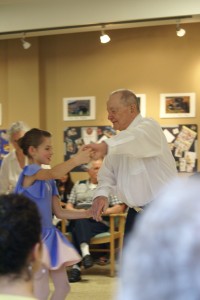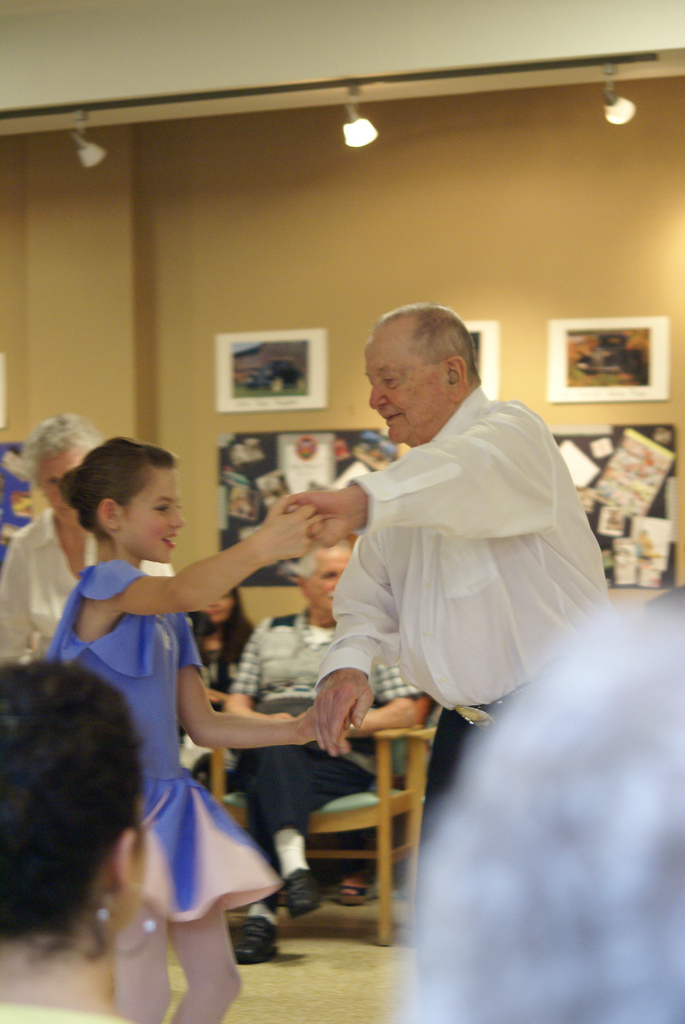By Dessa Bayrock (The Cascade) – Email
Print Edition: February 26, 2014

It is edging towards evening, long past the end time of most classes. We’re gathered in the black box theatre on UFV’s CEP campus, a room which, true to its name, is painted matte black on all sides. Scuffs line the wall at shoulder-height where theatre students have moved set pieces and practiced scenes. More importantly for this evening, a white projection screen hangs from the ceiling across from a few dozen chairs set up in rows. The room is intimately small; the faint smells of clean hair and cigarette smoke fill the air.
We’re here for a screening of They’re Not Scary, a documentary put together by media and communication studies professor Darren Blakeborough and a team of MACS students over the course of the last two years. The story follows the work of nursing instructor Shelley Canning, kinesiology instructor Michael Gaetz, and dance instructor Lee Kwidzinski. The goal of the project? Connecting children with elders.
Every Tuesday, a group of girls between the ages of eight and 10 travelled to a Mission senior’s home to learn to dance. As they learned to curtsey and plié, the seniors learned it with them.
Canning and Gaetz tested the seniors periodically during the process, both mentally and physically, to gauge the effect of these dance lessons. The results were inconclusive – little progress was made with the seniors’ strength or memory.
But the effects are easily found elsewhere. As Canning takes to the podium to explain the project to a rapt audience, even though more than a year since the project came to a close, tears aren’t far from her eyes or voice.
The lights dim; the show begins. Blakeborough’s voice fills the small theatre, speaking over images of the elderly in popular media. We see two old people fighting over a bag of crisps, a woman lying on the ground with her cane out of reach, feebly crying “Help! I’ve fallen! And I can’t get up!” and finally four seniors playing strip poker — to the chagrin of their orderly.
Blakeborough’s calming voice leads us through the portrayal of the elderly in popular media, explaining how we view elders as weak and fragile — ineffectual members of society.
And then we meet the girls.
In a montage of interview footage, they explain to us how excited and nervous they are to meet the elders, how they suspect they’ll be better at dancing than the seniors, why they think their elderly counterparts might not be able to move as quickly as they can. One girl explains that she prefers not to use the word “old.”
“What do you prefer instead?” Canning asks. “Over-age,” the girl replies, promptly.
We watch them meet the seniors and greet them by name — shyly at first, and then confidently, and finally by nicknames. Grampa. Troublemaker.
One Tuesday, the girls tour the home instead of taking a dance lesson with Miss Lee. They visit one of the elder’s rooms — Eleanor. She is hunched over, her hair completely white and her eyes crinkled shut, but her smile spreads across her entire face.
“You’re all so dear!” she exclaims, greeting the girls in a row. The last one hugs her impulsively.
After the project drew to a close in summer of 2012, Blakeborough and two MACS students combed through over 400 hours of footage, piecing together the documentary. They have caught winks, grasped hands, and sweet moments between children and elders, too many to count.
The last is the recital, the final performance, the climax of the project. The girls and seniors dance together, twirling to the high, clear voice of a folk singer.
But perhaps the best is the eponymous phrase, out of the mouth of babes.
“What have you learned so far?” a MACS student asks from out of frame, as the girls gather their things at the end of a lesson.
The reply is paired with a beautiful smile.
“They’re not scary!”


